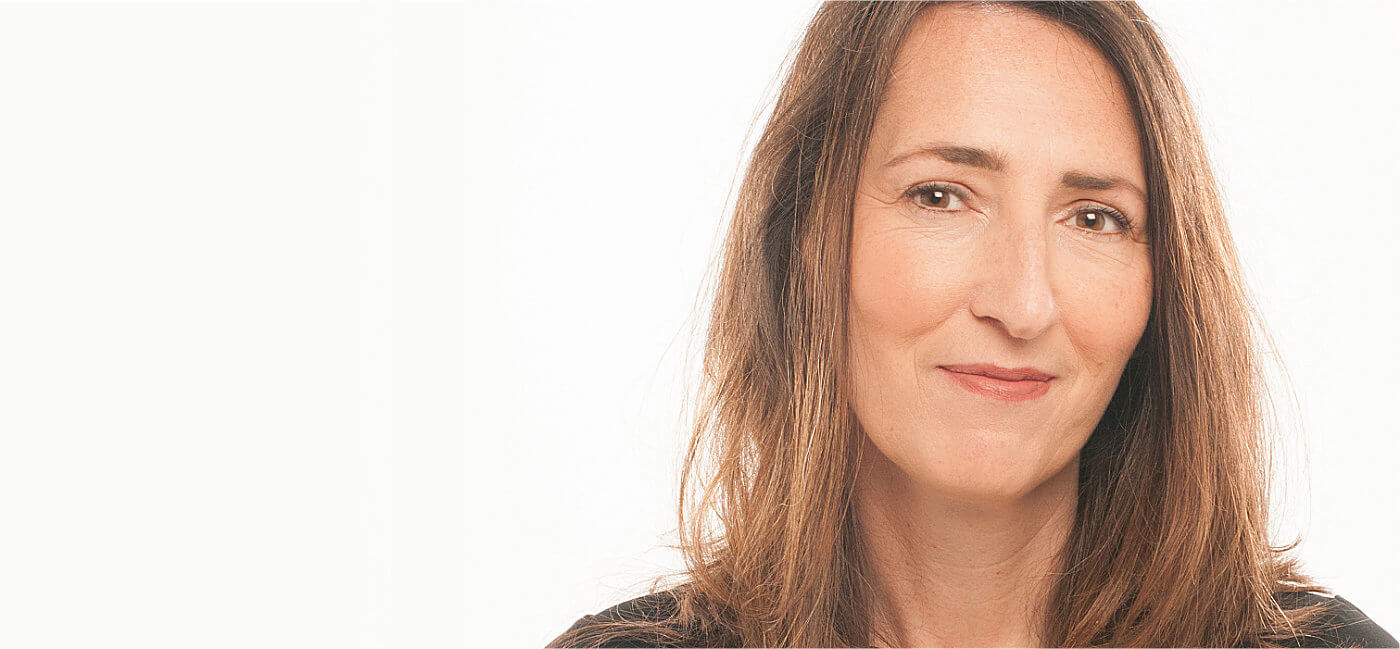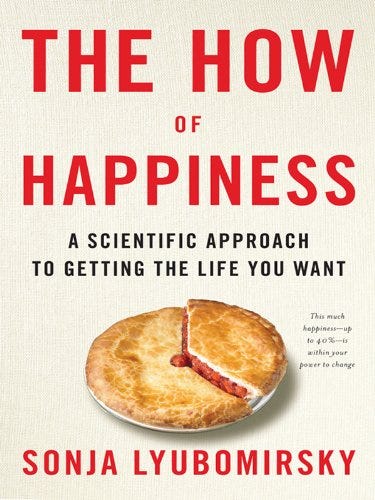On Staying in the Moment and Raising Happy Kids
Dadditude #2 with The How of Happiness Author Sonja Lyubomirsky
Sonja Lyubomirsky knows a thing or two about the science of happiness.
She’s spent her career studying the impacts of happiness, why some people are happier than others and how to respond to difficult situations.
She distills a huge amount of these insights in her fantastic book, The How of Happiness. In the book, she attempts to determine the scientific formula for what makes people feel happy.
We spoke with her recently about applying some of these same lessons to parenting, raising happy kids and how to be in the moment.
[Dadditude] Tell us a little about yourself.
[SL] I’m a professor of psychology at the University of California, Riverside and I’ve been studying happiness for over 30 years! I also have 4 kids - two sets of two (same dad!) -- ages 7, 10, 19, and 21.
[Dadditude] In your book The How of Happiness you mention that our circumstances and genes form part of our happiness potential.
But you also highlight the level of control we can have through our thinking and behavior. As a parent, what patterns and behaviors have you proactively put in place to make the most of your potential happiness ?
[SL] A lot of what we do, how we behave, and how we think in our daily lives affects our happiness beyond genetic influences or our circumstances. So, any version of positive thinking, being optimistic, looking at the bright side, is helpful to me. Questions like “what is the silver lining?”, “what have I learned from this?” are also helpful.
Seeking social support, talking to other parents in detail about what I’m going through made me realize that I wasn’t alone and there likely wasn’t anything wrong with my child.
Moms tend to talk to other moms a lot more about their kids and in a lot of details whereas dads don't seem to go into much detail. Whenever we used to have something happening with our kids, my husband would be like "Oh my God! There's something wrong!” He didn't realize that actually this happened to a lot with other families because he wasn't talking to other dads.
I also think living more in the moment is so important because all these years pass so quickly. We always have so much on to-do lists. So when we are with the kids we really try to immerse ourselves and live in the moment and not think about what we have to do, the orthodontist we have to go to tomorrow, and just enjoy the moment.
[Dadditude] How can parents accompany their children on that path to control their happiness? What has research shown to be effective for different kids' age groups?
[SL] The same kind of strategies that work for adults seem to work for kids. Getting kids to try to express gratitude is a powerful one because kids are notoriously ungrateful and they just take everything for granted.
Similarly, being kind to other kids and other people makes everyone feel good. That's something that's pretty easy to teach kids. There are people who do these interventions with kids around gratitude and kindness or mindfulness. These days it seems like every school in the US has meditation and Social Emotional Learning (SEL). It’s a big hot topic, and there's a lot of evidence behind it.
Then as a parent you can model those behaviors just like you model reading. You also model that if you break something you don't scream and get all upset about it, you're, "OK, let me let me handle this". When kids are younger, they're more amenable in terms of following your footsteps. They’ll internalize a lot of things without ever showing you. They are listening, even though they're pretending they're not listening, and actually are internalizing those good behaviors, gratitude, kindness, savoring happiness.
But I don't want parents to think that all they need to do is just model good behaviors and that kids will follow because we know that genetics really does have a big component in happiness. And so some of your kids are just going to be naturally happier than others and they're not necessarily going to be naturally grateful just because you model that behavior. For some, it will just take more effort and they have to really want to change. It's like if you're in therapy, you have to want to change.
Now, you don't have to be happy all the time, but if you're in a bad mood all the time, that's not a great model. I did an intervention with high school students where they wrote gratitude letters to their parents, teachers or coaches. They had a good effect: the students ate healthier across time, reported that they were more satisfied with their lives and were more likely to want to improve themselves. These interventions can go a long way.
[Dadditude] Can you tell us about a favorite moment with your kids recently?
[SL] When my daughter was seven she got really into spelling and so every night since, we've been doing this spelling. She wants me to give her really hard words to spell. And I’m often working and so I'll be looking at whatever I'm reading and I'll be like giving her words from that. And she writes them down, and mostly gets them wrong, but she is very excited to learn how to spell.
I love teaching my kids. I taught all of them to read, when it was that age. I had another kid that we used to spend hours and hours doing math problems together. But I'm a professor, so I guess I would enjoy those kinds of things.
[Dadditude] What do you think is your biggest strength as a parent?
[SL] I think it's love. I work a lot so I don't have as much time as other parents do, but I always thought that what I do give to them is this unconditional positive regard. I'm just very loving and I'm very affectionate with them, all the time. There's research on the fact that kids’ self-esteem in part comes from knowing that their parents or other people, truly, truly love them no matter what. I know I had that from my mom; no matter how bad my life was, like when I was a teenager, I knew my mom truly, truly loved me.
[Dadditude] What stresses you out most these days as a parent?
[SL] As I have an intensive job, I am not always as available as I’d like when they have problems. There's a saying “a Jewish mother is only as happy as her least happy child”, and of course it applies to all parents and I think it's really wise.
Whether it's a mental health kind of problem or physical health or a problem with their friends, it's extremely stressful. You seek social support, you do the best you can, but that's really hard, because sometimes it’s things that other parents don't understand. They haven’t necessarily had to face the same kinds of problems. And if your kid is having trouble making friends, what do you do? Because it’s not like you can't make friends for them.
[Dadditude] What's one parenting challenge you've tried to tackle recently, how, and how did it go? How do you think overcoming/coping with challenges as a parent impacts overall happiness?
[SL] Well, one of my kids is very moody and just gets upset about things when it's not right. She's a perfectionist, and she’ll get very frustrated and crying immediately. That's been challenging. We're working on it, we talk and try to calm down, relax for a moment, think about this, because maybe she'll never completely change but we want her to learn strategies. She needs to because as she grows up the problems might get bigger.
[Dadditude] What side of parenthood do you wish you had invested more time and energy in the past?
[SL] Spending more time traveling with the kids. The best thing our family ever did was spending a summer in Paris when our two older kids were eight and 10. It was difficult to get it all to happen and it was extremely expensive but it was amazing. I wish we did that more. For our older kids that summer in Paris affected them forever, and they still talk about it. My oldest daughter ended up going to Paris to study abroad when she went to college. Speaking French is an important part of her life. She's minoring in French. More things like that, which I know only some people can afford to do, but something out of the ordinary. Recently we have been planning to do the same thing in Berlin.
[Dadditude] What's the one piece of advice you'd like to give your younger parent-self?
[SL] We had the advantage of having two sets of kids 10 years apart, and it was so much easier with the second set. The biggest reason is that we don't get as upset, starting with when they're babies and crying and you feel helpless because they're crying. But now it's still aversive because you're human, but you just don't get as overwhelmed with things like that. Or you think "Oh they're not reading and they should be reading better." Now I think well, "OK, that's fine, you know, they'll catch up". Nothing is so big. So I guess that would be my advice younger myself. The problem is that it's hard to take that advice.
Even if it is a cliche is that it all goes by so fast. I remember I was at this birthday party with a colleague and my kids were five and her kids were 18. And she said, "Oh, I remember when my kids were five. Do you know how long it's been since my kids were five? Five minutes".
And it's true, it just goes by so fast. I used to hate when people would say to me, "You should enjoy the moment". I'd be with the baby and I would be sleep deprived and it was hard to hear that kind of advice. But we should remind ourselves more often just how fast it goes by and really enjoy the moment.
Further Reading
Thanks for reading ! Please consider sharing this newsletter with your friends. A quick forward to a dad friend would be very welcome.
Next week, we’ll be featuring our interview with Sonos CEO Patrick Spence.
See you then!



